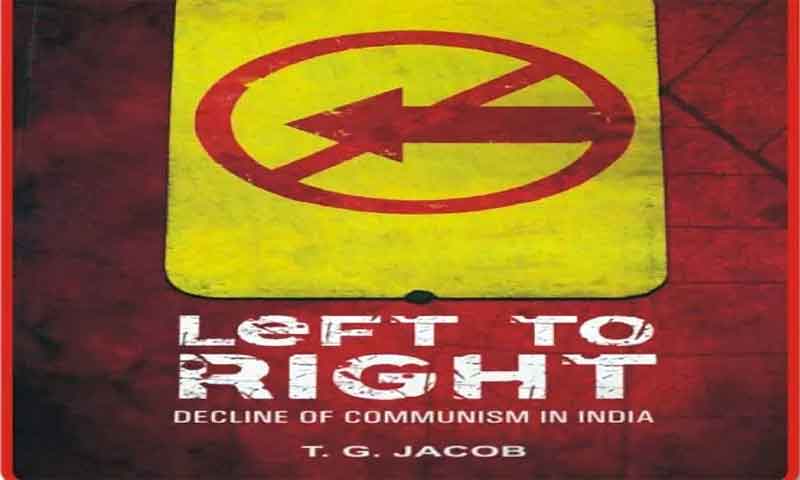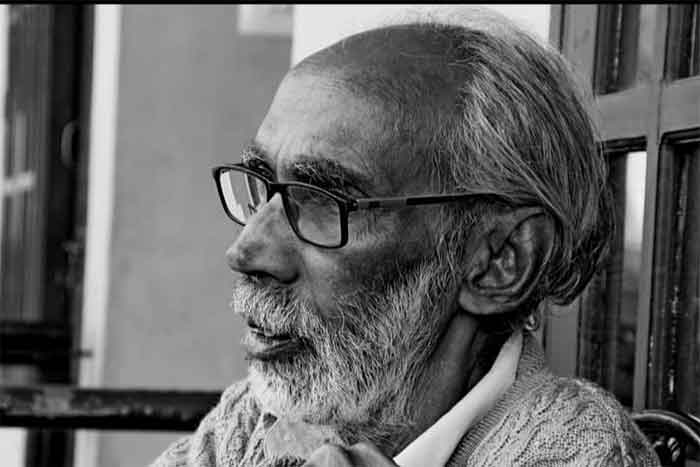
A sad Christmas. I have been receiving innumerable phone calls and messages from friends, comrades, and academics, expressing disbelief over TG Jacob’s demise. I am equally shocked. His departure was like an unannounced walkout. Just the previous morning we had a long chat over phone on the political situation in Kerala and elsewhere, his ongoing writing on Kerala’s development processes, and my long-delayed attempt to carve out a book from my thesis on the economic history of Travancore. We hardly talk about our private past, but not so this time. Jacob recalled our shared times in Delhi winters and Kerala monsoons, the hazardous journey to Kheerganga long before it became a tea-house trek, wanderings in and around the abandoned gold mines in Kolar, and the outstretched Theyyam nights in Malabar.
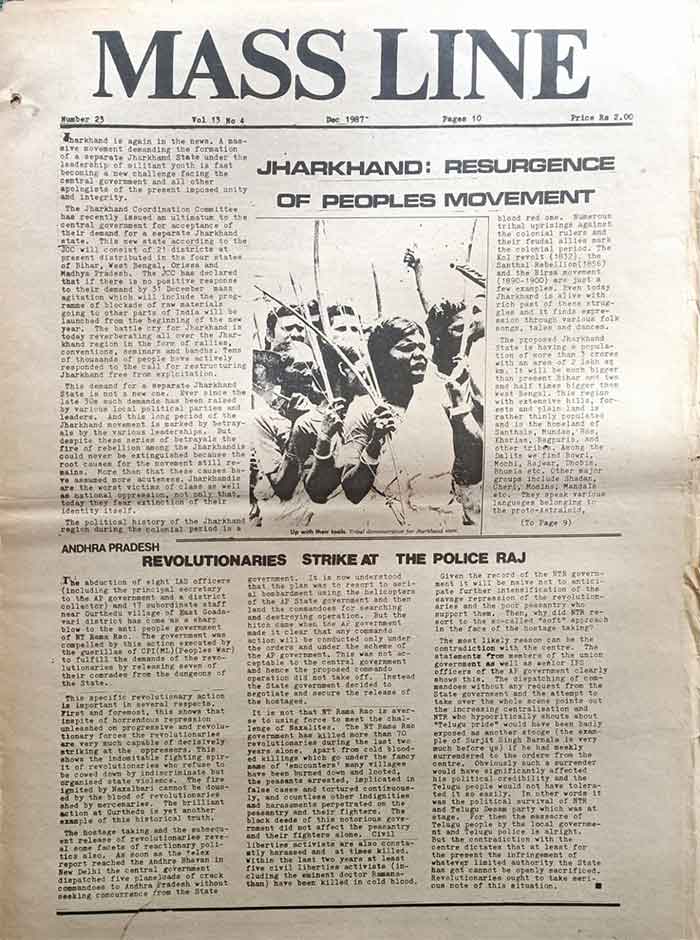
Jacob’s life was a long walk along the freedom-path. When he abandoned doctoral research in JNU to take up the editorship of the far-Left journal Mass Line, his teachers were upset but not surprised. They had seen him at the forefront of many a militant struggle within and outside the campus and knew that it was unlikely that he would pursue a conventional career path. It was just that they were unhappy to see that the academia was losing a promising economist. Mass Line was brought out by the Central Reorganising Committee (CRC), Communist Party of India (Marxist-Leninist). It was not the official mouthpiece of the CRC but the editorial board comprised only party card-holders. Published from Kerala beginning from the early 1970s, the editorial office was shifted to New Delhi with Jacob assuming charge in 1981.
What the academia lost was to the gain of the society at large. Jacob’s editorship infused a fresh breath to Mass Line. The years from 1981 to 1987 during which period Jacob edited Mass Line were undoubtedly the heydays of the journal. Certainly, the political conditions of the times, the vitality of campus discussions, the robustness of the party which published the journal, and the intellectual calibre of other members of the editorial board counted. The times were tumultuous. Within the country, events of great political importance followed in quick succession: for instance, the military attack on Golden Temple complex, assassination of Indira Gandhi, anti-Sikh riots, and gas disaster in Bhopal, all happening within a span of six months in 1984. The world was being swept by various forms of aggression, submission, and resistance. These were the years of the Soviet intervention in Afghanistan, Iran-Iraq war, US airstrikes against Libya, Palestinian Intifada, and the beginning of Perestroika and Glasnost. Planned economies were fast succumbing to the dictates of multinational corporations and international financial institutions. On the horizon was unbridled capitalism. Through it all, Mass Line stood with the oppressed and Jacob spearheaded this activist journalism. A distinctive feature which the journal acquired under Jacob’s editorship was its coverage of international events. Many of the outstanding international reports that appeared, like the one on the Soviet occupation of Afghanistan, were eye-witness accounts penned by the new editor himself. Besides, the journal liberated itself, even if partly, from the sloganeering style characteristic of party publications. There was a remarkable improvement in the quality of prose. The layout attained elegance by doing away with screaming captions in over-sized fonts and by reducing the use of exclamation marks.
Under Jacob’s lead, fortnight after fortnight, the journal came out with incisive pieces on the lived economy. The articles embodied a kind of sensitivity that was missing in academic studies. While the latter mostly dealt with state policy and its success and failure as reflected in a set of development indices, Mass Line articles unraveled the much-less discussed brutal other side of the state – its lawlessness and the ferociousness with which it suppressed the struggles for existence by the poor. These articles were not obsessed with issues of sampling and statistical significance as was characteristic of academic studies, yet came out with substantive, qualitative field-level observations. The reports threw light on peoples’ struggles for land and wages, issues of bonded labour, caste wars, assertions of tribal identities and territorial self-determination, and violation of human rights. Rather than revolving around a set of concepts or replicating stereotyped frameworks, they began with the immediate phenomenon and sought to dig deep and disclose the dynamics of social transition. Importantly, even while centralising concrete analysis of concrete conditions, the reports did not shy away from theoretical abstractions. The overriding point, however, was to change the concrete conditions rather than merely interpreting these.
As editor, Jacob travelled widely, creating new networks and raising financial resources for the journal. This also helped to widen the range of writers and to expand the readership. He visited university campuses, talked to students, and inspired them to write. Increasingly, articles were sourced from discussions with young researchers. Many of them were first-time writers. As long as their ideas made sense, Jacob did not bother about the writing style. The only caveat was that it should be direct and pointed. To the greatest possible extent, he spared the editorial scissors. It was in the course of one such campus visit during the mid-eighties that I got to meet him first. The elections to the Kerala Assembly were round the corner and we sat for long hours in my hostel room in the Centre for Development Studies discussing the electoral manifestoes of the rival fronts. These read more or less the same and were marked by an unwillingness to engage with the structural issues of the regional economy. Jacob returned to New Delhi after a week or so, carrying my first article of any considerable length. Titled ‘Kerala: Elections and Real Issues’ it was published in the special number of May 1987.
A major theoretical contribution of Jacob to Marxist-Leninist literature is the neocolonial thesis. Developed in close association with other intellectual activists in the CRC, the thesis grew out of the recognition that the ‘classical’, Naxalite characterisation of India as a semi-feudal and semi-colonial entity fails to factor in the important changes occurring in the internal development processes and in the international political-economy since the sixties. The changes included, among others, the decline in the economic power of feudal forces and the rise of a definitive stratum of capitalist farmers following the spread of cash crop agriculture; the development of productive forces in the manufacturing sector, the dependence on imported capital and technology notwithstanding; the commodity exchange and technology transfer deals that marked new forms of exploitation by imperialist powers, including the Soviet Union; and India’s regression into a debt economy. Resistance to the neo-colonial state was viewed to assume varied forms including workers’ strikes, farmers’ agitations, tribal assertions, and territorial and linguistic nationality struggles.
Indeed the idea of neocolonialism, or indirect colonialism or neo-imperialism as varyingly called, in the sense of extraction of economic surplus even in the absence of formal political rule had been in vogue for long. A 1963 document of the Communist Party of China noted that despite formal independence the Third World had not been able to shake off imperial control. “While wolf has left by the front door, tiger has entered through the back door”. Third World countries continued to be objects of aggression and exploitation by their former masters. Political and economic control was exercised through a grid of international cooperation and development institutions based in the West and their puppet regimes and local agents in the former colonies. Foreign aid was the major mechanism through which the colonies were retained as a market for surplus capital and commodities. Occasionally, such control assumed the form of military aggression. In the academic sphere too, Paul A Baran’s The Political Economy of Growth (1957) and subsequently, the works of the Dependency school had dealt with the idea of neocolonialism. Yet, before Jacob, it had not been sharply formulated in the Indian context, especially focussing on the internal contradictions and in conjunction with the nationality question.
Jacob’s book on neocolonialism, India Development and Deprivation: Neocolonial transformation of the economy in a historical perspective, was brought out in 1985. Its arguments broadly run thus. The metropolitan nations are driven by the need to expand the market for capital, technology, and industrial commodities worldwide. The development of productive forces in agriculture and industry in the former colonies therefore assumes importance. Full-fledged and independent development of productive forces would have, however, exhausted the need to draw on metropolitan supplies. The neo-imperial policy of develop and control was born in this context. The metropolitan requirements coincided with the needs of big capital in the colonies, the latter being a junior partner of global capital. Over time, in India, these processes gave rise to contradictions between the rural bourgeoisie on the one hand and the big capital and the state on the other. While the prices of agricultural produce were set by the state, those of manufactured goods, including agricultural inputs, were left to the market forces. Such a situation widened the gap between agricultural input and output prices to the advantage of metropolitan capital and its local players but to the detriment of the farming classes. Temporary concessions like subsidies and hike in minimum support price failed to offset the imbalance. Another social group that was pushed to great disadvantage was the tribal people. During the colonial period, with increasing restrictions on shifting cultivation, they had been persistently pushed to less fertile land. In the post-independence times, the mega development projects, wildlife conservation areas, and mines displaced them and limited their access to forest resources, eventually turning them into wage-labourers. The manufacturing sector was beset with contradictions between workers in organised and unorganised sectors, permanent and contract workers, factory owners and workers, small-scale units and large-scale units, and regional bourgeoisie and pan-Indian monopoly houses.
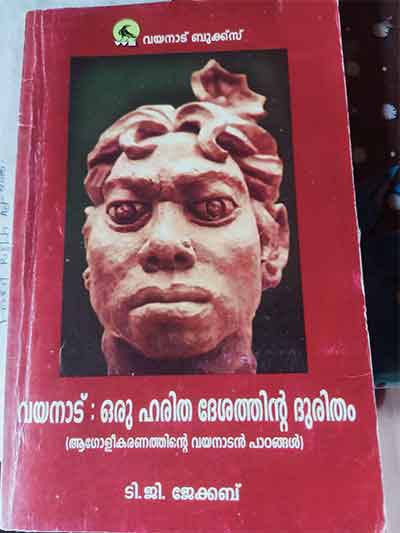 Alongside advancing the neocolonial thesis at the general and macro level in India Development and Deprivation, Jacob sought to explore how it unfolded at micro and meso-levels. In fact, Jacob had first expounded the idea of neocolonialism by undertaking a case study of Kerala titled Kerala: A Backward Economy on the Neocolonial Track as early as in 1981. Two more case studies on Kerala were subsequently published: Tales of Tourism from Kovalam (1998) and Wayanad: Misery in an Emerald Bowl (2006). These enquired into the working of the dependent development model characteristic of neocolonial transformation in relation to two micro regions within Kerala. The first was set in the context of global tourism and the second corresponded to cash crop agriculture. In Madyakeralam (Boozeland Kerala) published in 2003 Jacob explored the political economy of alcohol consumption in Kerala. These studies, however, were in the nature of preliminary investigations waiting to be developed.
Alongside advancing the neocolonial thesis at the general and macro level in India Development and Deprivation, Jacob sought to explore how it unfolded at micro and meso-levels. In fact, Jacob had first expounded the idea of neocolonialism by undertaking a case study of Kerala titled Kerala: A Backward Economy on the Neocolonial Track as early as in 1981. Two more case studies on Kerala were subsequently published: Tales of Tourism from Kovalam (1998) and Wayanad: Misery in an Emerald Bowl (2006). These enquired into the working of the dependent development model characteristic of neocolonial transformation in relation to two micro regions within Kerala. The first was set in the context of global tourism and the second corresponded to cash crop agriculture. In Madyakeralam (Boozeland Kerala) published in 2003 Jacob explored the political economy of alcohol consumption in Kerala. These studies, however, were in the nature of preliminary investigations waiting to be developed.
Meanwhile, Jacob carried out a detailed study of Punjab in transition. The book Chaos in Nation Formation: case of Punjab (1988), set against the Khalistan agitation, showed how suppressing the struggles for national self-determination was critical to the perseverance of the neocolonial state. It was pointed out that the all-India market was the major edifice of the neocolonial state and any attempt to create a sovereign nation-state outside its fold would not be tolerated. An outstanding feature of Punjab’s post-1960 agricultural economy was market integration.
 The Green Revolution saw a spectacular expansion of agricultural output. As the output market expanded, so did the market for technical inputs such as farm machinery, fertilisers and pesticides. Huge investments were made in infrastructure including irrigation, electricity generation and distribution, roads, and warehouses. Formal and informal institutions flooded the credit market. The labour market expanded with the influx of migrant workers from neighbouring states. The role of the state expanded while powerful, new strata of big traders, industrialists, moneylenders and labour contractors emerged. With agricultural produce prices decided by the state and input prices set by big capital, farmers had control over neither. Save the early years of Green Revolution, the terms of trade turned against agriculture. While industrialists and traders steadily prospered, the farming community correspondingly lost. Agricultural subsidies failed to compensate the losses suffered by farmers. The big traders based in cities were mostly Hindus while the majority of farmers were Sikhs. Also, as migration tended to freeze or even depress local wage levels, contradictions developed between resident Sikh workers and migrant Hindu labour. These caused economic contradictions to assume a communal hue.
The Green Revolution saw a spectacular expansion of agricultural output. As the output market expanded, so did the market for technical inputs such as farm machinery, fertilisers and pesticides. Huge investments were made in infrastructure including irrigation, electricity generation and distribution, roads, and warehouses. Formal and informal institutions flooded the credit market. The labour market expanded with the influx of migrant workers from neighbouring states. The role of the state expanded while powerful, new strata of big traders, industrialists, moneylenders and labour contractors emerged. With agricultural produce prices decided by the state and input prices set by big capital, farmers had control over neither. Save the early years of Green Revolution, the terms of trade turned against agriculture. While industrialists and traders steadily prospered, the farming community correspondingly lost. Agricultural subsidies failed to compensate the losses suffered by farmers. The big traders based in cities were mostly Hindus while the majority of farmers were Sikhs. Also, as migration tended to freeze or even depress local wage levels, contradictions developed between resident Sikh workers and migrant Hindu labour. These caused economic contradictions to assume a communal hue.
The neocolonial thesis marked such a radical departure from the fundamental premises of Marxist-Leninist theory and practice in the country that it took a while to gain acceptance even within the CRC. The rest of the Marxist-Leninist parties in the country were outright hostile to the new formulation. As the idea of agricultural backwardness owing to feudal relations recedes from analysis, so does the need for an agrarian revolutionary programme that hinges on the elimination of feudal lords as a precondition for moving towards socialism. Countering neocolonialism required an altogether different agenda of linguistic and territorial nationality assertion that involved alliance with those sections of the local bourgeoisie which had sharp contradictions with the pan-Indian big capital and the Indian state. The enemy had to be redefined. Radical Marxist-Leninist parties continued to hold fast to their earlier programme of agrarian revolution. Those Marxist-Leninist parties which had taken to parliamentary politics could not anyway be expected to retract and take up arms against the state.
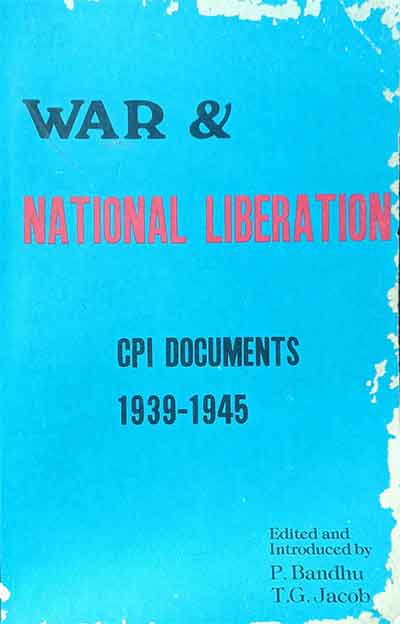
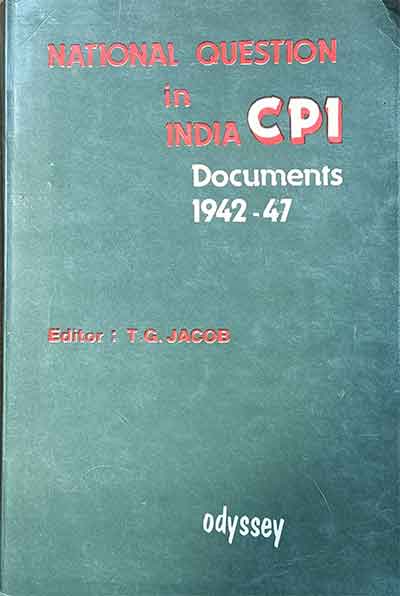 Considering that the question of neocolonialism overlapped with the national question, Jacob increasingly turned his attention to studying the approach of the Indian communist movement towards the latter. Towards this, together with Pranjali Bandhu, he meticulously researched the communist party documents on national question. Following this, two volumes were brought out in 1988: National Question in India: CPI Documents 1942-47 and War and National Liberation: CPI Documents 1939-1945. The introductory essays of these compilations highlighted the initial ambiguity and the subsequent regressive shift of the Indian communists relating to national question in India. The undivided communist party had upheld the Leninist theory of right of self-determination of nationalities and supported the nationalist aspirations of the diverse linguistic communities. At once however, there was a conceptual tension because even while suggesting that India is a multinational country the idea of the Indian nation was not forsaken. The tension was sought to be overcome by noting that the genuine unity of India could be attained through a voluntary union of different nationalities. Over time, the CPI and the CPI (M) turned into being staunch champions of ‘national’ integrity, viewing all self-determination assertions as imperialist conspiracies meant to weaken the country.
Considering that the question of neocolonialism overlapped with the national question, Jacob increasingly turned his attention to studying the approach of the Indian communist movement towards the latter. Towards this, together with Pranjali Bandhu, he meticulously researched the communist party documents on national question. Following this, two volumes were brought out in 1988: National Question in India: CPI Documents 1942-47 and War and National Liberation: CPI Documents 1939-1945. The introductory essays of these compilations highlighted the initial ambiguity and the subsequent regressive shift of the Indian communists relating to national question in India. The undivided communist party had upheld the Leninist theory of right of self-determination of nationalities and supported the nationalist aspirations of the diverse linguistic communities. At once however, there was a conceptual tension because even while suggesting that India is a multinational country the idea of the Indian nation was not forsaken. The tension was sought to be overcome by noting that the genuine unity of India could be attained through a voluntary union of different nationalities. Over time, the CPI and the CPI (M) turned into being staunch champions of ‘national’ integrity, viewing all self-determination assertions as imperialist conspiracies meant to weaken the country.
Beginning from the early 1980s till his end, Jacob subscribed to the characterisation of the Indian state as neocolonial and upheld the claim of self-determination of nationalities, including the right to secede. Such consistency in larger political thinking notwithstanding, towards the end of the 1980s, there occurred a critical shift in his perception of party organisation. For quite some time he had been discontented with what he viewed as the undemocratic functioning of communist parties including his own. He noted that the entrenchment of party bureaucracy showed that democratic centralism was largely a myth. Dissent met with suppression of facts, repression of deviants, and often, their expulsion from the party. At a more intimate level, Jacob was distressed by the disappearance of a JNU student, who was a delegate at the party’s all-India conference held in Maharashtra in 1982. It was many years later that Jacob came to know that the student had died under mysterious circumstances at the venue itself. This had not been revealed to the conference participants then nor admitted by the party leadership even subsequently.
Near about a decade later, on February 17, 1991, when a section of the former members and fellow travellers of various Marxist-Leninist parties held a convention in Kerala to discuss issues relating to democratisation of the communist movement, Jacob was on the dais. He noted that the rationale advanced in defence of centralism in the pre-revolutionary days was that the party was struggling against heavy odds. Once the party captured power, again centralism was defended as being necessary to protect the nascent state from attacks by the capitalist forces. This logic reinforced the party bureaucracy and their policing of party members and supporters. The people who make sacrifices for freedom are betrayed by the leadership forever. The oligarchic organisation cut across all communist parties, radical or reformist. As Jacob observed, those who do not practise democracy among themselves cannot hope to liberate the masses. Their parties can only transfer power from one oligarchic group to another. Sometime earlier, Jacob had snapped organisational ties with the CRC and his participation in the democratic convention was a definitive public statement of the fact.
Jacob left the party but the storm within him never died down. Not bounded by the party line, his scholarly enquiries garnered greater independence and momentum. Together with Pranjali Bandhu he first established a publishing venture, Odyssey, and subsequently a research unit, the South Asia Study Centre. The Centre’s prime objective was to pursue and promote research on national, ethnic, religious and minority questions and aspects of caste and gender in South Asia. Operating from the Nilgiris district in Tamil Nadu, the Centre facilitated a host of studies including Reflections on the Caste Question: The Dalit Situation in South India (2000), Eastern Marxism and Other Essays (2008), Back to Basics: A JC Kumarappa Reader (2011), Left to Right: Decline of Communism in India (2012), and Encountering the Adivasi Question: South Indian Narratives (2019). Most of these works were jointly edited by Jacob and Bandhu.
In his later writings, Jacob affirmed that there was no qualitative difference between bourgeois political economy and Marxist political economy on the idea of development. Both viewed accumulation of capital as the engine of human progress, disregarding the fact that the so-called progress was attained at the expense of nature and the poorest sections of people. For both global capitalists and Marxist ideologues, nature was merely a source of wealth waiting to be conquered and exploited. Those who advocated a symbiotic relationship between humans and nature were condemned as backward-looking and despised for deterring human progress. Under these conditions of a shared ideology of development the exploitative relations among people and between humans and nature continued unabated. The party bureaucracy became a new ruling class and state capitalism manifested itself as a variant of private capitalism. Industry was sought to be developed at the cost of agriculture. Sectoral imbalances became the norm causing severe shortages and dislocations. Alienation of labour failed to disappear. Improvement of material conditions were often attained at the cost of humanist ideals.
From his critique of the development idea and its accompanying institutional structure, it was a short distance to the reflections of JC Kumarappa. Jacob began to view land reforms, decentralisation, and self-reliance as advocated by Kumarappa as effective antidotes to the intrinsic violence of the capitalist system. He explored why Kumarappa’s ideas were cast aside by the policy planners of post-1947 India. Development is a powerful ideological tool to misrepresent the interests of capital as the interest of the whole people. Its targeted outcome was the unfettered expansion of the capitalist market. All political parties, whether Left, Right or Centre, uncritically uphold the idea of development. The fact that it destroys the environment, dispossesses the poor, and increases inequality is suppressed. The inevitable consequence of the dominant model of development is that multitudes are uprooted from the villages and forced to crawl into the already crowded urban centres. Jacob noted that those who indict Kumarappa’s ‘villagism’ as utopian were merely bent on manipulating the villages to serve the cities.
Jacob kept working till his last breath. Not only qualitatively but also quantitatively his works were a cut above that of most academics attached to formal institutions of teaching and research. His intellectual output is incredible: besides half a dozen books, a rough estimate shows that he had published over 400 articles. Jacob’s politics was reflected in the choice of publishers as well. He shunned monopoly publishing houses. Save newspaper articles, nearly all his writings appeared in alternative journals like Frontier and Bulletin of Concerned Asian Scholars besides Mass Line. Translations of some of these articles and others were published in Oli and Edatha (Tamil) and in Madhyamam, Kerala Padanangal and Maruvakku (Malayalam). Of late, Jacob had started writing in Malayalam, his mother tongue, and many articles were published in the Malayalam newspaper Thejas.
During the last few months Jacob was working on a new book on Kerala economy. It was proposed to be a synthesis of his earlier writings but with a more careful examination of the aspects of environment, caste and gender. Also, efforts were on to update two earlier books: India: Development and Deprivation, with observations on the conjunction of interests of big capital and majority communalism, and Chaos in Nation Formation: case of Punjab, by incorporating insights from the recent farmers’ agitation.
Jacob was unique but at once very much that generation – round pegs in square holes, straight shooters, a bit wild, not fond of rules, and with no respect for the status quo. People who were crazy enough to think that they could change the world. They did too, even if not fully and not exactly the way they desired. Jacob carefully watched and documented the state. The state in turn kept a watch over him, even after he died. Communist leaders of Kerala are often bid farewell with gun salutes in their honour. The presence of the state manifested itself in a different manner at Jacob’s funeral. Policemen in civilian clothes descended to find out who facilitated the funeral, who attended it, and who spoke at the condolence meeting that followed. Cheers, Jacob!
Dr KT Rammohan is former Dean, Faculty of Social Sciences, Mahatma Gandhi University, Kottayam. Email: [email protected]
[Originally published in Mathrubhumi Online English edition, January 10, 2023]




